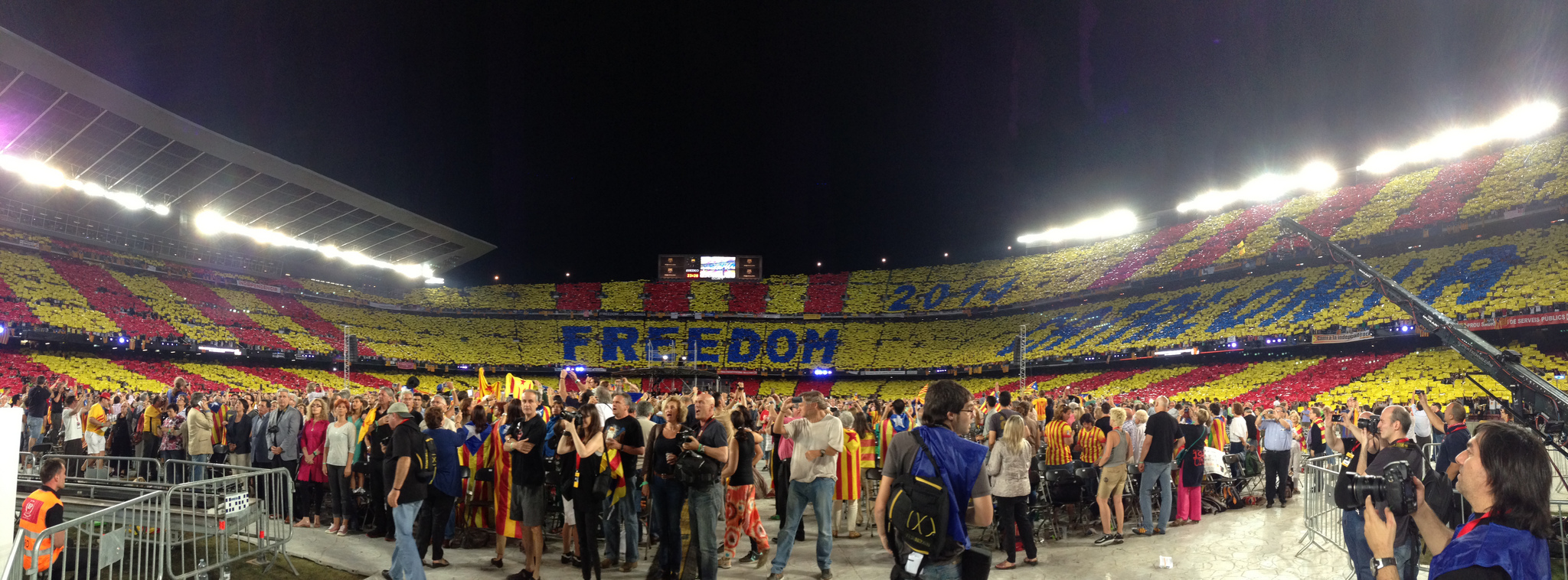How the region’s three major soccer clubs, and their fans, relate to the independence referendum

In the midst of Catalonia’s disputed independence referendum, with images of voters clashing with police being broadcast around the world, football was the last thing on the minds of most international onlookers. The politics behind the referendum are complicated, and the Spanish government’s response to the effort left roughly 850 people injured. And yet, while many of us were moved by images of Catalan firefighters shielding voters from batons and elderly women being hauled out of polling stations, thousands of Catalans were thinking about the match that day. Barcelona was to play Las Palmas at the Nou Camp, and there were doubtlessly many Barça fans who planned to vote in the morning and then head to the game.
Football in Barcelona is highly politicised by nature. Like many Catalan institutions suppressed by Francisco Franco’s regime in the aftermath of the Spanish Civil War, FC Barcelona is a symbol of Catalonia’s regional identity. In the end, it was played behind closed doors in protest against the police response to the referendum as well as to avoid security issues. The Barcelona players posed in their training shirts—in the red and yellow of the Catalan Senyera—ahead of kick off. The players of Las Palmas wore shirts embroidered with the Spanish flag and released a statement supporting “the unity of Spain.”
Barcelona, Espanyol, Girona: each Catalan club has its own relationship with the independence debate. Even Barcelona, which from the outside might seem like a pro-independence club, is not quite so easy to define. While the club’s leadership has been vocal in its support of democracy and the Catalan people’s right to vote, this does not necessarily mean that those leaders harbor separatist sympathies. Catalan independence would likely turn out to be very tricky for the club, since La Liga has warned that independence would exclude Barça from taking part in the competition.
Likewise, it would be a mistake to assume that all Barça fans favor an independent Catalonia. While the Senyera and Estelada are often flown at the Nou Camp and fans have been known to chant “Independencia!” on 17 minutes and 14 seconds—a reference to the year 1714, in which the successful Siege of Barcelona by Philip V of Spain led to the suppression of Catalan rights—there are over 150,000 socis (club members) in Catalonia and a wide range of opinions among them. Barça provides a romanticised image as a symbol of Catalan identity, but fans’ views of independence are likely to be grounded in pragmatic details relating to financial and legal concerns as they are in the club’s political lore and mythology. Nonetheless, the Estelada still flies in the stands and cries of “Independecia!” are shouted louder than the slogans of the ‘No’ campaign.
La Liga newcomer Girona FC hasn’t been quite as vocal as Barça on the politics of the referendum, but the city is often described as a pro-independence stronghold and their supporters have been known to chant in favor of independence. Then there’s Espanyol. A simple reading of the situation would place the Periquitos on the opposite end of the political spectrum. (The clue is supposedly in the name—“Spanish”—though it is true that the club’s name was changed from the Spanish spelling “Español“ to the Catalan spelling back in the ’90s.) However, emblems of Catalan identity have graced the Estadi Cornellà-El Prat in recent times, along with many Spanish flags and unionist refrains.
Espanyol’s leadership has largely remained silent on the issue of the referendum, but the club nonetheless joined the Catalan general strike alongside Barça and Girona to protest the violent tactics used to stifle the vote. Clearly, the relationship between Catalan football and independence is anything but straightforward, even if it is manifest in everything from protesters in Barcelona shirts to Gerard Piqué’s Twitter feed.
“I have friends who follow Espanyol that want independence as much as Barcelona supporters,” says Marc, a 25-year-old resident of Barcelona. “But it’s well known that among the Espanyol supporters, in any match, you will see flags of Spain as well as Catalan flags. That’s rare at the Nou Camp, where Spanish flags are not often seen. Also you will hear more people talk in the Spanish language [at Espanyol], particularly the anthems and songs for cheering the team.
Though common, expressions of national identity at soccer stadiums here are not uncontroversial.
“No club stands directly in favour of independence, arguing the plurality of their fans’ social views and opinions,” says Josep, a Barcelona fan and president of one of the club’s official penyes (fan groups). “Sometimes, [support for the referendum itself] has been misunderstood and some members have harshly criticised the position of the club, believing that they have positioned themselves in favor [of the ‘Yes’ campaign].”
It’s not as simple as being able to discern somone’s political views by which jersey they’re wearing. Nor can Catalonians achieve what some Americans have been wishing for in recent months—namely, to separate political and sporting matters.
“I did witness one incident of strong counter-referendum sentiment after the Las Palmas game was directed to be played behind closed doors,” Owen, a 25-year-old British resident of Barcelona, told me.
Fans don’t like to miss out on football, whatever their politics.
Follow Will Magee on Twitter at @W_F_Magee.
